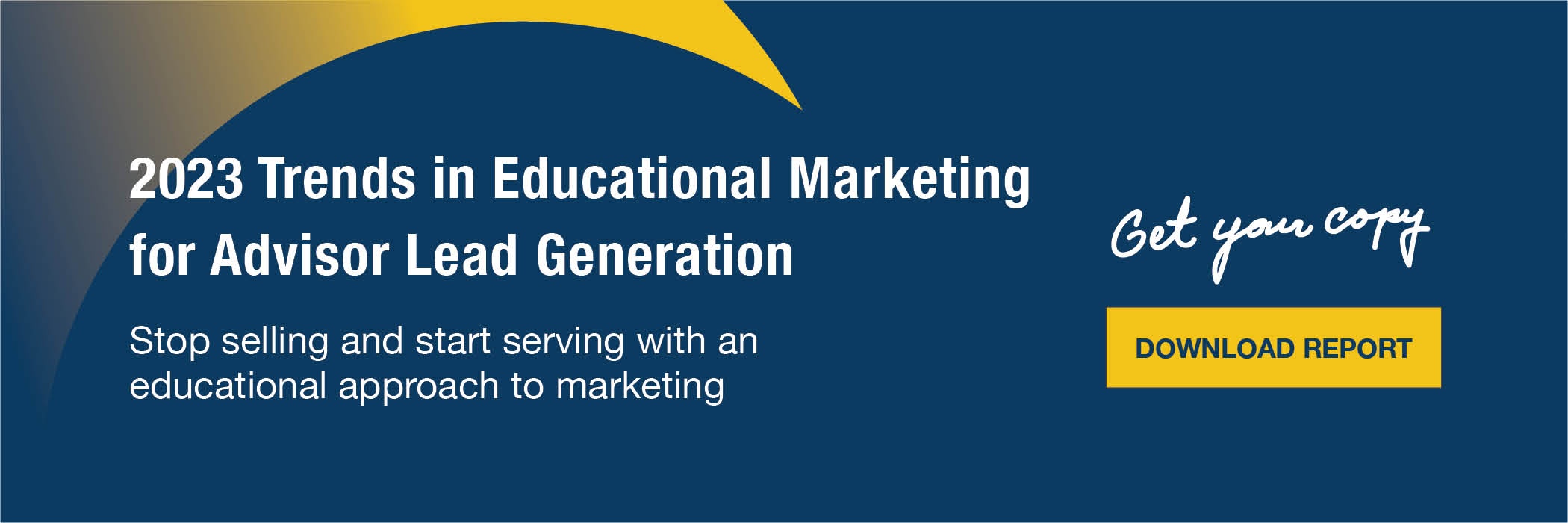What’s the best way to prospect as a financial advisor in 2024? The answer may surprise you — but it shouldn’t. For anyone reading the tea leaves, the current American mindset on financial matters makes it clear as day.
It’s education.
Yes, today’s advisors are leading with knowledge and leveraging the power of education to earn lifelong clients. There’s no more fertile ground for cultivating meaningful relationships with pre-qualified attendees who have a vested interest in their financial lives than a financial education course.
Let’s take a closer look at your prospects — the attendees of these courses — to understand where they’re coming from and why there’s no better time to engage them in the classroom than now.
Why are your prospects looking for education?
Americans are dealing with a lot in today’s uncertain and increasingly complex financial world — not to mention their busy day-to-day concerns. However, the things that make them unique can be roughly categorized by their age cohort and current place in their financial lives. When considering how to prospect as a financial advisor, it can help to separate your audience into something like these three groups:
Motivated Wealth Accumulators
Affluent, mature millennials — yes, millennials are in their forties! — and Gen X’ers are a big emphasis for forward-thinking advisors. This cohort is sandwiched between aging parents and dependent children, making their financial lives a bit of a tug of war. They’re interested in financial education because:
- As a whole, they do a ton of research, like lots of facts, and are motivated to improve their lives and relieve the stress
- They’re more likely than other groups to spend money on things of value (like education)
- They prefer a holistic approach to their financial life…they want a financial coach, not just an advisor to manage a portfolio.
Pre-Retirees
These are families with children often still in the home. They’ll tend to be the most educated and wealthiest group, perhaps married, career-focused, and often involved in their communities (especially in rural areas). To wrap your head around why they’re looking for financial education, take note that:
- Many have used online investing within the last 12 months
- They’re deeply concerned about estate planning, understanding trusts, and taking a proactive approach to secure the future for themselves and their families
- They’re skeptical of traditional marketing and advertising, but like to conduct their own research and enjoy attending exclusive events
Early Retirees
This older group tends to be married, but are most likely empty-nesters. Active in their communities, these folks are already beginning to enjoy some of the things they have planned for in retirement. As high-level professionals who are very near retirement, they’re seeking financial education because:
- They like to consume a lot of information and news, but tune out traditional advertising
- Financial concerns for retirement are at the forefront of their minds
- Personal connections and authenticity really matter for them in a professional relationship
American anxiety about finances is real. People need advisors.
There’s a lack of knowledge about money matters in America that has created a state of general financial anxiety. Research shows that 42% of adults think about their finances every day, and 72% of U.S. adults are stressed about money. More than half report feeling anxious whenever they think about personal finances. Families need help.
This situation shouldn’t be too surprising, given the state of financial education. We’re the wealthiest country in the world, but we don’t know how to manage wealth — only 57% of U.S. adults are financially literate, and we rank lower in financial literacy than Canada, Australia, and most of Europe.
The financial education gap reflects the lack of opportunity to learn in the U.S. A vast majority (93%) of adults over 45 believe their state should mandate financial education. However, only 21 states currently require high-school financial education, and only 6 states mandate a semester-long course.
Without a solid understanding of money management, families find themselves facing worry and uncertainty, especially as they consider the future and how to cover expenses such as their children's education or life after retirement. And confidence in these matters is trending down.
The 2023 Retirement Confidence Survey offers a few key insights:
- Under two-thirds of American workers are confident in their ability to retire, and only 18% are very confident.
- Compared to 2022, American retirement confidence has significantly dropped to levels not seen since 2018. The last time a decline in confidence was this severe, the 2008 global financial crisis was in full swing.
- 4 in 10 Americans don’t understand retirement and investment options like target date funds (TDFs), and 3 in 10 don’t understand managed accounts.
Against all of this backdrop, the survey also showed that financial advisors remain the most trusted source for both workers and retirees. People are looking for advisors now more than ever.
Lead with knowledge: start financial advisor prospecting with education
There’s a clear opportunity for advisors to leverage their natural skillset. Advisors are born teachers. By demonstrating your experience and knowledge of financial matters, you’re more likely to become a “first call” for interested attendees who are feeling stress and looking for financial answers. A relationship that starts in the classroom builds trust naturally, through engaging in face-to-face conversations. Follow-up meetings for customized advice will emerge on their own as attendees seek further assistance.
Contact FMT today to learn more about the clear opportunity advisors have to offer in-depth subject matter on retirement income planning, wealth management, and family changes. Our educational approach to financial advisor prospecting puts you in a position to grow your business by helping families on their own terms.
